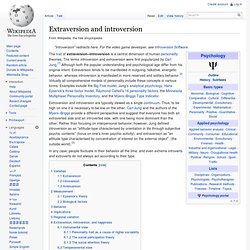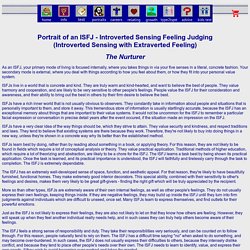

Psychology. MBTI personality test. Getting What You Want. Personality. Personalities. MBTI. Personality Types. Extroversion and introversion. The trait of extraversion–introversion is a central dimension of human personality theories.

The terms introversion and extraversion were first popularized by Carl Jung,[1] Although both the popular understanding and psychological age differ from his original intent. Extraversion tends to be manifested in outgoing, talkative, energetic behavior, whereas introversion is manifested in more reserved and solitary behavior.[2] Virtually all comprehensive models of personality include these concepts in various forms. Examples include the Big Five model, Jung's analytical psychology, Hans Eysenck's three-factor model, Raymond Cattell's 16 personality factors, the Minnesota Multiphasic Personality Inventory, and the Myers–Briggs Type Indicator. In any case, people fluctuate in their behavior all the time, and even extreme introverts and extroverts do not always act according to their type. Varieties[edit] Extraversion[edit] Introversion[edit] 7 Steps to Enhance you Personality. Every single human being has a personality either it can be good or bad it all depends on the person.

Personality plays a huge part in our lives and it can effect or even change peoples decision such as in an interview where the interviewer might probably judge you from your personality whether to hire you or not. It is no doubt that appearance plays an important role in shaping the personality of a person but appearance is not the only important aspect of a good personality. There are two types of personalities in a human being. One is God gifted and the second is a person’s own efforts in making his/her personality great.
The ways we try to improve our personality may range from minor external changes, such as a new suit or a new look, or to more serious internal changes, as we try to improve our outlook on life or our ability to interact with other people. Below are just a few easy tips on helping you to improve your personality: 1. 2. 3. 4. 5. 6. 7. ISFJ (Defender) Personality Type - Jungian. Myers-Briggs Type Indicator. Model of personality types A chart with descriptions of each Myers–Briggs personality type and the four dichotomies central to the theory The Myers–Briggs Type Indicator (MBTI) is an introspective self-report questionnaire indicating differing psychological preferences in how people perceive the world and make decisions.[1][2][3] The original versions of the MBTI were constructed by two Americans, Katharine Cook Briggs and her daughter Isabel Briggs Myers.[4] The MBTI is based on the conceptual theory proposed by Swiss psychiatrist Carl Jung,[5] who had speculated that people experience the world using four principal psychological functions – sensation, intuition, feeling, and thinking – and that one of these four functions is dominant for a person most of the time.[6] The four categories are Introversion/Extraversion, Sensing/Intuition, Thinking/Feeling, Judging/Perception.

Each person is said to have one preferred quality from each category, producing 16 unique types. ISFJ. This article is about the Myers-Briggs personality type.

For the Socionics ISFj, see Ethical Sensory Introvert. ISFJ (Introversion, Sensing, Feeling, Judging) is an abbreviation used in the publications of the Myers-Briggs Type Indicator (MBTI) to refer to one of sixteen personality types.[1] The MBTI assessment was developed from the work of prominent psychiatrist Carl G. Jung in his book Psychological Types. Jung proposed a psychological typology based on the theories of cognitive functions that he developed through his clinical observations.
The MBTI instrument[edit] The MBTI preferences indicate the differences in people based on the following:[5] Free personality test, type descriptions, relationship and career advice. Portrait of an ISFJ. As an ISFJ, your primary mode of living is focused internally, where you takes things in via your five senses in a literal, concrete fashion.

Your secondary mode is external, where you deal with things according to how you feel about them, or how they fit into your personal value system. ISFJs live in a world that is concrete and kind. They are truly warm and kind-hearted, and want to believe the best of people. They value harmony and cooperation, and are likely to be very sensitive to other people's feelings. People value the ISFJ for their consideration and awareness, and their ability to bring out the best in others by their firm desire to believe the best.
ISFJs have a rich inner world that is not usually obvious to observers. ISFJs have a very clear idea of the way things should be, which they strive to attain. ISFJs learn best by doing, rather than by reading about something in a book, or applying theory. The ISFJ feels a strong sense of responsibility and duty. Things You Should Know About Introverts.